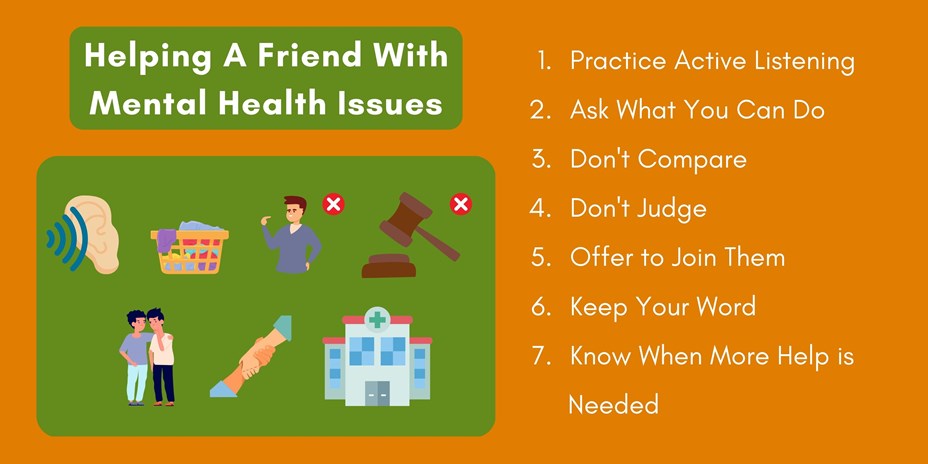One in five adults and children experiences a mental illness in any given year. Those problems can contribute to onset of more serious long-term conditions such as major depression, bipolar disorder or schizophrenia. Approximately one-half of chronic mental illness begins by the age of 14. Unfortunately, long delays—sometimes decades—often occur between the time symptoms first appear and when people get help. These delays lead to problems at home, at work, in school, and in forming relationships.
If someone in your life is going through a challenging time that affects their mental health, Mental Health America and the mental health professionals at Dakota Family Services give the following tips for being helpful.

1) Practice Active Listening
Active listening is different than just hearing what a person has to say. A good active listener puts everything aside and gives their complete attention to the person who is talking; asks open-ended questions to get more details about the topic that is being discussed (ex. “And how did that make you feel?”); and takes moments throughout the conversation to summarize what they’ve been told and make sure they are understanding clearly.
2) Ask What You Can Do
It can be tempting to assume what would be helpful to someone who is struggling, but it’s always better to ask them what they need from you. If you ask and get a response like, “nothing, I’m fine,” offer a few suggestions for things you would be willing to do (without being pushy). For instance, you could offer to sit with them and watch a movie, cook them a meal, or pick up a few things for them at the store.
3) Don’t Compare
If a friend or loved-one is going through a tough situation and they come to you for support, you might feel tempted to tell them about something that happened to you and how you were able to get through it. It’s okay to share about similar experiences but be careful not to compare, because it can make someone feel like their pain isn’t valid. For instance, if they are telling you about a breakup, don’t mention how you had a much harder divorce. Focus on what you did to cope with feelings of loss or loneliness.
4) Don’t Judge
To be truly supportive of someone, you need to put your personal opinions and biases aside. They may be struggling because of a mistake they made, or you may think they are overreacting, but you will never know what it is truly like to be that person in this moment, and criticism is not helpful to their recovery.
5) Offer to Join Them
When someone is going through a time of sadness or uncertainty, their emotions can take over and leave them feeling paralyzed and unable to take care of life’s obligations. Offering to go with someone to help them take care of responsibilities like walking the dog, going to the grocery store, attending doctor appointments, or picking up the dry cleaning can give them a sense of accomplishment and lift their spirits.
6) Keep Your Word
If you have offered your support to someone and told them you would do something, keep your word. When a person is struggling, the last thing they need is to feel abandoned by someone else. If you absolutely can’t honor your promise, make a sincere apology and find another time you can do what you said you would.
7) Know When More Serious Help is Needed
Sometimes the support you can offer won’t be enough. If you find that the situation is becoming more serious, please contact a mental health professional. They will be able to provide more intensive support and treatment when necessary. Remember, no one should ever be ashamed of going to therapy or taking medication for their illness.
We've created a list of mental health resources to support parents, children, and adults in many areas. You can also get help now by calling the 988 Suicide and Crisis Lifeline. It is free, confidential, and available 24/7.
Mental illness can be a difficult thing to deal with for both the person affected and their loved ones. However, things you do can help them on their journey. The tips we’ve shared should give you a good place to start. We hope that by following these tips and reaching out for help when needed, you will be able to create a supportive environment for those living with chronic mental illness.
Additional Resources:
- Spoon Theory: A Metaphor for Chronic Illness (podcast episode)


